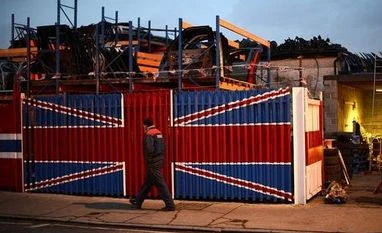British inflation cooled more than expected in September to a three-month low, offering some relief for consumers who have been squeezed financially since the Brexit vote, data showed on Wednesday.
Consumer price inflation rose at an annual rate of 2.4 per cent in September, compared with August's unexpected six-month high of 2.7 per cent, the Office for National Statistics said.
That was well below the consensus of a Reuters poll of economists for a fall to 2.6 per cent.
"Food was the main downward pull on inflation as last year's September price rises failed to reappear, while ferry prices dropped after their surprisingly high summer peak," ONS statistician Mike Hardie said.
On Tuesday, the ONS said the basic wages of workers rose at their fastest pace in nearly a decade over the summer months.
That backed up the Bank of England's view that a long period of weak pay increases is ending, and that it should raise interest rates in response.
Also Read
Still, the wage growth of 3.1 per cent remained meagre by historical standards when adjusted for inflation.
The BoE expects inflation will drift down but will remain just above its 2 per cent target in two years' time as it gradually raises borrowing costs.
Consumer price inflation hit a five-year high of 3.1 per cent in November, when the inflationary effect of the pound's tumble after Brexit vote in June 2016 reached its peak.
While that has started to subside, Wednesday's ONS figures suggested there could be more short-term pressure in the pipeline for consumer prices.
Among manufacturers, the cost of raw materials - many of them imported - was 10.3 per cent higher than in September 2017, up from a revised 9.4 per cent in August.
That was a bigger rise than any economist had forecast in the Reuters poll that had pointed to a rise of 9.2 per cent.
Manufacturers increased the prices they charged by 3.1 per cent compared with 2.9 per cent in August, again stronger than all forecasts in the poll that had pointed to a 2.9 per cent increase.
The ONS also said house prices in August rose by an annual 3.2 per cent across the United Kingdom as a whole, the smallest rise since August 2013 and compared with a 3.4 per cent increase in July. Prices in London alone slipped 0.2 per cent.
)